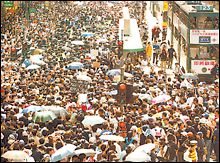By Robert Marquand | Staff writer of The Christian Science Monitor
July 02, 2003
 HONG KONG HEATED: In the largest demonstration in the city since the 1989 Tiananmen
Square crackdown, residents protested a new Beijing-sponsored law despite sizzling heat.
HONG KONG HEATED: In the largest demonstration in the city since the 1989 Tiananmen
Square crackdown, residents protested a new Beijing-sponsored law despite sizzling heat.
BOBBY YIP/REUTERS
BEIJING China's fitful experiment with the rights and openness associated with democracy proved volatile Tuesday. Chinese Premier Wen Jiabao left Hong Kong hours ahead of the largest opposition protest in a decade, and new Chinese President Hu Jintao drastically revised a speech in Beijing that had been expected to promote reforms, like voting, inside the Communist Party.
Hundreds of thousands of Hong Kong residents took to the streets on the sixth anniversary of the handover to China of the former British colony. Their grievance: an "anti-subversion" law known as Article 23 that is expected to pass next week. Opponents fear it will become an instrument to stifle free expression and imprison dissenters.
When first proposed last summer, Article 23 was ignored, save by a handful of activists and editorial writers. But the glittering city has since fallen on tough times - aggravated by the SARS crisis, and a widely held feeling that Beijing is tipping its favors toward Shanghai, an economic rival of Hong Kong. In this atmosphere, Article 23 has become for some residents a symbol of Beijing's unwanted efforts to control their city. Business leaders in particular say Article 23 will harm the city's bankable image of autonomy inside China.
Ironically, protest over Article 23 is bringing a new political awareness to a city famous for its economic vitality - and famously disinterested in matters of government.
Premier Wen, who Monday signed an important tariff-reducing trade agreement with the city, cut short his stay as public displays began. Activists torched the flag of the Chinese Communist Party, and peaceful protesters chanted, "Return rule to the people." Many wore black on a sweltering day to mourn what they said was the demise of rights and freedoms that Chinese officials pledged to preserve under the "one country, two systems" formula during the 1997 handover from London to Beijing.
While Wen came to Hong Kong to show it is part of "one country," analysts say, he saw evidence that people have not forgotten the "two systems" model. Chinese news sites on the mainland Tuesday filtered and blocked links to stories on the protest, and CNN was briefly blacked out.
Official polls in Hong Kong were at odds with private polls on Article 23. Government numbers claim a majority in support of antisubversion laws that allow the arrest of people "associated" with groups banned on the mainland such as Falun Gong. But a Hong Kong University poll released Tuesday found 54 percent oppose it, and only 18 percent support. One elderly woman told reporters she was marching to protect the rights of "future generations."
Public feeling, though, runs much deeper than one law. Since joining China in 1997, the once-proud city, one of the four Asian "mini-dragons," now has 8 percent unemployment. Chief Executive Tung Chee-hwa is widely disliked; he is regarded as a rubber stamp for Beijing. Moreover, Chief Tung did not weather the SARS crisis well. He was accused of downplaying it too long, not criticizing Beijing for its own cover up of SARS, and for never visiting the Amoy Gardens apartment complex in Hong Kong that was the epicenter of the outbreak.
Wen, by contrast, cut a softer and more sympathetic figure. He made an unscheduled trip to Amoy Gardens, held the infant of a SARS victim, and stated that he had waited "too long" to come to the troubled place. However, he canceled a planned meeting with college students. One student from Singapore told reporters that he would have asked Wen if Chinese leaders would ever "come clean" on the Tiananmen Square massacre.
[...]
http://www.csmonitor.com/2003/0702/p06s01-woap.html
All content published on this website is copyrighted by Minghui.org. Minghui will produce compilations of its online content regularly and on special occasions.
Category: Falun Dafa in the Media









